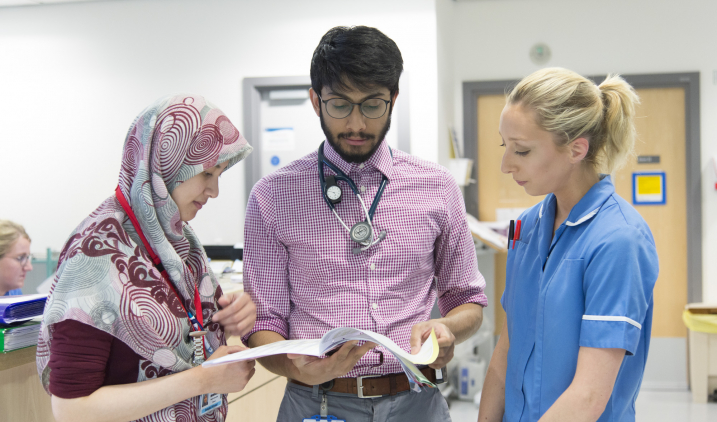General internal medicine
Doctors working in general internal medicine treat patients with a wide range of acute and long-term medical conditions.
You’ll spend the majority of your time working between an acute medical unit, medical admissions unit and a medical ward managing patients with a wide range of clinical problems.

Life in general internal medicine
Vital to your success will be your ability to accurately diagnose patients, manage uncertainty, deal with co-morbidities (complex medical problems involving multiple symptoms and conditions) and recognise when the opinion and intervention of another specialist is required.
Typically, you’ll deal with:
- advanced cardiopulmonary resuscitation
- direct current (DC) cardioversion (a procedure to convert an abnormal heart rhythm to a normal heart rhythm)
- temporary cardiac pacing
- insertion of venous lines (peripheral and central)
- aspiration of fluid from chest and abdomen
- insertion of drainage catheters into chest and abdomen
- lumbar puncture
- prescribing of drugs for acute and long-term conditions
Most doctors working in general internal medicine obtain dual specialty e.g. cardiology and general internal medicine, acute internal medicine and general internal medicine or geriatric medicine and general internal medicine.
Your dual specialty will increase your patient involvement and see you collaborate with a wide range of colleagues as part of an acute medical care workforce.
A large part of your day will involve reviewing newly admitted patients and continuing treatment for the most unwell, as well as providing care for patients awaiting an operation but who have an acute illness.
Every day you’ll:
- diagnose and treat a wide range of medical disorders, referring for specialist opinion and care as appropriate
- provide advice and care for patients admitted to hospital under other specialties (e.g. surgery, obstetrics and gynaecology) who have medical problems
- diagnose and treat a variety of medical conditions that are referred to medical outpatient clinics
- manage inpatients and outpatients with co-morbidities, including elderly patients with frailty and dementia
Treating people who are acutely ill and often in life-threatening circumstances is highly rewarding but very challenging.
How much can I earn?
You’ll first earn a salary when you start your foundation training after medical school. The basic salary ranges from £32,398 to £37,303. Once you start your specialty training in the NHS, you can expect to earn a salary of at least £43,923, which can increase to between £93,666 and £126,281 as a consultant.
How about the benefits?
- make a difference
- flexible and part-time working
- high income early in your career
- work anywhere in the world
- excellent pension scheme
- good holiday entitlement
- NHS discounts in shops and restaurants
Must-have skills
- excellent communication skills to manage a wide range of relationships with colleagues, and patients and their families
- emotional resilience, a calm temperament and the ability to work well under pressure
- teamwork and the capacity to lead multidisciplinary teams
- problem-solving and diagnostic skills
- outstanding organisational ability and effective decision-making skills
- first-class time and resource management for the benefit of patients
Entry requirements
Your first step is medical school. Typically, you’ll need excellent GCSEs and three A or A* passes at A level including chemistry for a five-year undergraduate degree in medicine. Many medical schools also ask for biology and others may require maths or physics.
If you already have a degree, you could study for a four-year postgraduate degree in medicine.
You’ll need to pass an interview and admissions test. You’ll be asked to show how you demonstrate the NHS values such as compassion and respect.
Some medical schools look to recruit a mix of students from different backgrounds and geographical areas, so your educational and economic background and family circumstances could be considered as part of your application.
What are my chances of starting a career in general internal medicine?
There are approximately 891 consultants working in general internal medicine in the NHS in England.
How to become a doctor in general internal medicine
After medical school, you’ll join the paid two-year foundation programme where you’ll work in six placements in different settings.
After your foundation programme, you can apply for paid specialty training to become a doctor in general internal medicine, which will take a minimum of three years. Most doctors in general internal medicine obtain dual specialty, which will typically require a minimum of seven years training.
You may be able to train part time, for example for health reasons or if you have family or caring responsibilities.
Where a career in general internal medicine can take you
You could specialise in:
- acute internal medicine
- cardiology
- endocrinology and diabetes
- gastroenterology
- geriatric medicine
- renal medicine
- respiratory medicine
You’ll also have opportunities to conduct research and teach.